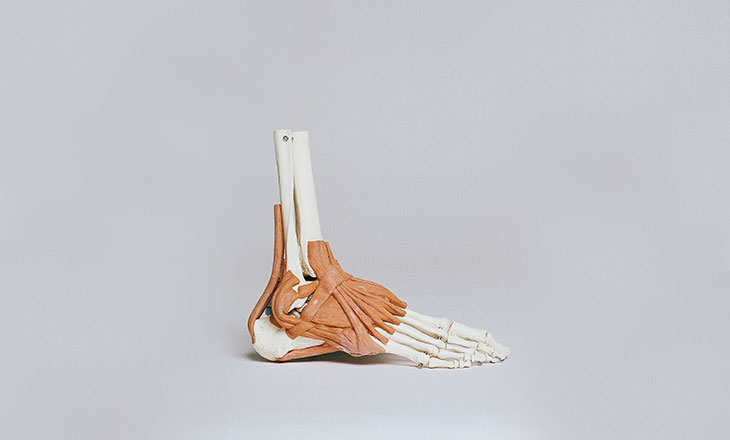In the fall of 2016, I trained for a half marathon. I was following a training program and increasing my miles each week. One week I ran a total of eighteen miles, which was the most I had ever run. The next day I went skateboarding, continuing my quest to learn to ollie, and I felt a pop in my calf. I couldn’t run for weeks. On race day, I ran the 5K instead of the half, feeling defeated but not wanting to injure myself any further.
This past summer of 2017, newly single and underemployed, I started running again and I got back into my routine pretty quickly. Two three mile runs during the week, then a five mile run on the weekend. It was so satisfying to be able to run long distances and then to return to shorter distances and feel how much easier they had become. I remembered why I had gotten into it in the first place and I was thankful for the distraction.
I was also using a calorie counting app for the first time. I set a goal weight and my daily calorie intake was supposed to be less than 2,000, which is pretty low. But I could apply negative calories for my runs and, because of my recent breakup, I was slightly nauseated all the time so I didn’t want to eat that much. Plus, because I am as big a fan of irony as I am of running, I had started smoking again, which is a handy appetite suppressant. So, I was dropping pounds pretty consistently.
Running was bringing with it some leg pain but whatever. Soreness is like a badge of honor for running.
I was getting a bit more than the normal calf soreness or shin splints, though. I had some weird pain up the sides of my legs around the ankles. I noticed a little numbness in my left foot when I would put on my sneakers but it didn’t seem like a big deal. Then I was walking home from a storytelling show when I noticed that my walk was strange. My left foot was flopping forward and would kind of slap the ground as I walked and I couldn’t correct it. I just figured it was muscle fatigue from so much running.
Luckily, I have a lot of runner friends that I could go to.
“Hey, do you guys ever get soreness up the side of your legs? And have you ever had a weird walk after running?”
“Uh, not really.”
My friend Justin said to do some ankle rotations for strength. I went home and did ten with my right foot. Then I switched to my left foot… and I couldn’t do it. My foot wouldn’t lift up for the upper half of the rotation. I tried but it wouldn’t go. This was the first time I had isolated the problem like this. My foot wouldn’t flex upwards. It felt like paralysis and it was really scary.
As a hypochondriac, I’ve learned never to go to the internet. If you google about heartburn, the internet will have you thinking that you’re in cardiac arrest. But sometimes you have to break the glass and pull that alarm. So, I googled my symptoms.
The Internet kept pointing to something. The symptoms were all there. Not being able to flex your foot up, the slapping of your foot against the ground as you walk. The real test for this was if you couldn’t walk on your heels. I tried and I could do it with my right foot but every time my left foot just weakly collapsed to the ground.
Then I read a little further about the cause of this condition and that’s when I started to panic.
I’m going to pause here for a second. I want you to do something for me. Seriously. You can do it seated or standing. Start with your feet flat on the ground. If you’re sitting, just lift your toes up, keeping your heels on the ground. If you’re standing, stand on your heels for a moment.
That motion you just did with your feet? Flexing them up? That’s called dorsiflexion. (The opposite motion, flexing your foot down like when you’re pushing on a gas pedal, is called plantar flexion but that doesn’t concern me. Plantar flexion didn’t fuck up my life for three months.)
I doubt you’ve ever given any thought to dorsiflexion. I didn’t until last summer but it’s important. When you take a step, you don’t just put your food on the ground. You actually use some dorsiflexion to lay your foot on the ground. But when you take a step and your foot sort of slaps the ground, you’ve lost dorsiflexion.
Here’s what should happen. The motion of your feet is actually controlled by the peripheral nervous system. The deep peroneal nerve should innervate the anterior compartment of the leg, flexing the muscles that run down to your foot and toes. When that’s not happening, the peroneal nerve isn’t doing its job. The question is why.
Here’s where it gets scary.
The deep peroneal nerve runs up your leg where it connects to your sciatic nerve. Your sciatic nerve connects to your spinal column in your lumbar spine and your spinal column connects to your brain. So, if you can’t flex your foot up, it could be a problem anywhere along that chain – including your brain. So, it could be a sign of peripheral nerve damage. It could also be a sign of a herniated disc or sciatica. Or it could be a sign of a stroke, Multiple Sclerosis, or ALS, Lou Gehrig’s Disease.
And now for the name of this condition. Are you ready? Here’s what it’s called.
Foot drop.
Yeah. “Foot drop.” Physicians decided to call the condition where your foot drops “foot drop.” It’s also known by its more complicated name “drop foot.” Looking back, this was one of the more infuriating parts of this whole ordeal, that the thing that could be a symptom of a life altering or threatening disease was given such a dumb name. That’s like having Alzheimer’s and calling it “brain work bad” or having cancer and calling it “cells gone wild.” You’re physicians for Christ’s sake, use some fucking Latin.
Once I read the possibilities, I knew I had to see a doctor and I needed to see a doctor fast. It was nighttime. I wasn’t going to wait until the morning to make an appointment. I went to the ER.
Even in my anxiety ridden state, I knew I probably didn’t have ALS or MS. I was pretty sure I hadn’t had a stroke. But then again, maybe I did. How the hell would I know? I’m not a doctor. I needed a doctor for some answers.
Before I left for the ER, I put out a call on Facebook, “Hey, do I know any physical therapists out there?” As I lay in the ER bed just waiting waiting waiting, messages started coming in. I heard from my friend’s wife, a physical therapist. She hadn’t encountered this before but suspected a herniated disc, the diagnosis of which would require an MRI that I did not have the money for (see “under employed” above). A friend of mine from college who is now a doctor asked me several questions and suggested I might have chronic compartment syndrome. My friend Greg who was a college athlete messaged me to reassure me. “Dude, my range of motion in my ankle is pretty bad too. This is probably nothing at all.” Cool, I thought. And then he said, “I mean, it’s not like you have foot drop or something.”
When I finally saw a doctor, I flexed my feet back for him. The left one just wouldn’t flex back that far. The doctor said, “yeah, you have foot drop but there’s not much we can do for you here.” I was diagnosed with peripheral neuropathy, told to follow up with my primary care doctor and a neurologist as soon as possible, and sent home.
I went to see my primary care doctor. I sat on the edge of the examining table with my shoes off. He held his hands underneath my feet, palms up.
“Alright press down on my hands, hard as you can.” Then he put his hands on the top of my feet. “Alright, push up, hard as you can.” I did. “Huh…” he said. “You said you had some numbness?”
“Yeah.”
“Okay, take off your socks. Now close your eyes. Can you feel this?”
“Yeah.”
“What about this?”
“Uh huh.”
“This?”
“Yeah.”
“Huh… Walk around the room for me.” I did. “Walk on your toes.” I did, no problem. “Okay, walk on your heels.” This was a problem. It was the signature move of foot drop. My left foot just kept collapsing to the ground.
The doctor left me in the room for ten to twenty minutes and returned with more doctors who did similar examinations and asked similar questions.
I went downstairs for blood work. Then I made an appointment with a neurologist. You know neurologists. They’re those doctors who focus on the brain and central nervous system. I had to see one of them because I couldn’t make circle rotations with my foot.
The hospital where I saw my neurologist is a teaching hospital. So, my neurology appointment started with a resident and a med student. The med student gave me a standard neurological exam. Where are we? What day is it? Who’s the president? Follow my finger with your eyes, etc.
Then the attending came in. She was the most decisive doctor I had seen yet, which I loved. Finally, I could get some answers. She looked over my chart. “Okay, he is B-12 deficient. Now,” she instructed her doctors, “no one who looks like this should have B-12 levels this low.” I assume by “like this” she meant outwardly healthy looking but I don’t know. “Okay,” she said, “walk for me. Now walk on your heels.” Same thing. My left foot just kept collapsing to the ground.
She prescribed a B-12 shot that day and for the next five days. Then, I would be given one once every week for a month. Then once a month. Then I would be given B-12 supplements to take at home.
“So, what are my chances that I’ll get back to normal and be able to run again?”
“High,” she said. “I’d say about fifty-fifty.” I respected this woman for her medical knowledge but we clearly had differing opinions on what constituted a favorable probability. After saying that, she left and went on to another patient and I didn’t really get the answers I was hoping for.
The B-12 deficiency could explain bad nerve health but as the doctors themselves noted it wouldn’t explain why it was only presenting in one place. And also why was I B-12 deficient in the first place?
There are a few causes for B-12 deficiency. It can be caused by being vegetarian or vegan. I am not vegetarian or vegan. You might have a condition that makes it difficult for your body to absorb B-12. So, I had a blood test and I had no such condition. It could be caused by gastric bypass surgery and, uh, nope. And finally, it could be caused by alcoholism.
Now I had not had the soberest of summers. Again, see “newly single and underemployed” above. The reasons for me not to go out until the wee hours whenever I felt like it were few. It wasn’t the kind of summer that I would accurately document for a doctor but it wasn’t Lost Weekend territory, either.
So, what was going on? As a hypochondriac, it’s the vague symptoms that are the scariest. My vision is blurry – brain tumor. I have a slight cough – lung cancer. But with foot drop, I hit the hypochondriac and, frankly, the generalized anxiety disorder jackpot. I had a credit card balance of several thousand dollars and no full time job in sight. I had no girlfriend (who, admittedly, I would have driven absolutely crazy during this period). I was just left to wonder and think. Is this going to get better? What happened? What is wrong with me?
The internet was maddeningly unhelpful. I searched far and wide for some sort of hope. “Recovery from foot drop.” Enter. Now it did say, “sometimes foot drop goes away on its own,” but I was not counting on that. What I found were tips like, “don’t have rugs in your home that may make you trip,” and tips for good canes to get to assist you in walking. You can also get a foot brace or, in extreme cases, have surgery to fuse your foot to your shin. But no talk of, “yes, you can heal from this.”
Doctors are very smart people but they’re people. They still have to figure things out. You, as their patient, are essentially a sentient puzzle and sometimes, when you’re solving a puzzle, you don’t know what to do. No one could tell me definitively what happened, why it happened, or what was going to happen.
“So, was it the B-12 deificiency?”
“That could contribute to it, yes.”
“Okay… so, did I injure myself?”
“That’s certainly possible.”
A month later, I would get an EMG from my neurologist. This is electromyography where you have needles stuck in you that measure the electrical activity of your nerves. And it’s really uncomfortable.
A month after that I would get an MRI on my lumbar spine just to see if a herniated disc could be pinching a nerve. Apparently I have a bulging disc but not bulging abnormally for a forty year old. (Thanks, doc.)
The doctors were making it clear that they were going to help me but, at the same time, I saw some of the other patients waiting for the neurologist. Have you seen who’s in the waiting room for a neurologist? I won’t get into it but suffice it to say that the guy whose range of motion in his left foot is off by a couple of inches is not the most in the need of attention.
They sent me to see a physical therapist. He did an exam similar to the one the doctors did.
“So, they haven’t told you why this is happening?”
“Well, they said I was B-12 deficient.”
“Did they tell you why?”
“No.”
And he kind of looked at me puzzled. “I’d, uh, I’d want to find that out.” He went and cut off a length of power resistance band for me and prescribed a series of five exercises to do at home.
So, every other day I would roll out my yoga mat, sit down, and wrap a red elastic physical therapy band around my left foot and try to flex it back.
I obsessed. I would be mentally checking my feet at all the time. What was that tingling? Is everything okay? At any moment, I might sit down on the floor, take my socks off and feel my feet for numbness. I would do this anywhere. I did it at the new job that I had started. I did it while I was coaching improv. I may have even done it in the subway (yes, I removed my shoe and sock on the subway, go ahead and judge).
And still I received no definitive answer. I would go to the doctor once a month for a shot, taking approximately three hours out of my day, and they would just check in with me, give me the shot, then send me on my way.
Then, at my second physical therapy appointment, a few days after I had started taking B-12 in tablet form, the physical therapist asked me to walk on my heels… and I could do it. It wasn’t perfectly strong but my foot wasn’t collapsing like it did. This was huge. Walking on my heels! I could do it the next day and the day after that.
A few weeks after that the numbness went away. I eventually tapered off physical therapy. Now I’m running again.
At my last doctor’s appointment, I told my primary care doctor that I had gotten better. But then I asked, “So, what do you think it was? I mean, was it some kind of injury? Was it the B-12?”
And my doctor, presented with a healed patient, sentient puzzle solved, said, “I mean, these things happen.”
I still get scared, though. A month or so ago I was up in Vermont for a skiing weekend with some friends from college. I was sitting in a chair in the living room of the inn where we were staying and I was checking my feet, flexing them back as I do. “Uh, what are you doing?” my friend’s wife asked. I told her this story. It turns out my other friend’s wife is a doctor specializing in sports medicine.
“Yeah, I would have prescribed B-12 shots, that’s pretty standard.”
“But why was I deficient?” And then I remembered something. “I did lose like twenty-five pounds last year with a calorie counting app.”
“Rapid weight loss?” she said, “Yeah, that’d do it.”
Finally, an answer.
I’ve always been so uncomfortable with uncertainty and, to put in terms of the serenity prayer, telling the difference between the things I can change and the things I have to accept. For the anxiety ridden person, the hint of awful things to come is worse than the actual awful things. When my father died and left me an orphan, I calmly set about settling his affairs. But when my foot wouldn’t move like it was supposed to, I panicked for months.
Ultimately, this is who I am, for better or worse. And I’m in a body that is aging and will provide endless causes for concern until, one day, it shuts down. But that’s not happening any time soon. Sometimes there are just curious cases and you recover and you move on, just like every traumatic thing in life.
These things happen.





Thank you, it’s rare that I get to laugh out loud about foot drop. I especially laughed over what you wrote about the name “foot drop”. I’ve had it for over 10 years, but some days I really get steamed up over the stupid name for this condition that has hobbled me for so long. I also got a chuckle out of the other patients in the neurologist’s office. I finally made it to a neurologist in San Francisco, sure that he would know what to do after backwoods doctors in the Pacific Northwest were totally uninterested in my foot. After a thorough exam, his final statement was ” In two years you’ll either be better or worse”. I refrained from violence or even a smart retort. It’s served as a warning to never go to a neurologist again. I’ve seen many wonderful alternative healers, learned a lot about body/mind and become very spiritual. I’m thrilled you are better. Even though I’m not better, it was fun reading your article.